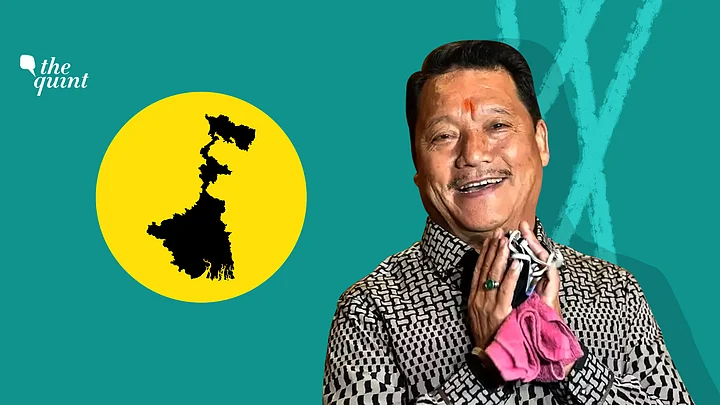Bimal Gurung – the firebrand leader of Gorkha Janmukti Morcha (GJM) from Darjeeling – has surfaced in Kolkata on 21 October 2020 after remaining in hibernation for three years.
He reportedly disappeared from the scene after Amitabha Malik – the young police sub-inspector – had fallen prey to bullets on 13 October 2017 while carrying out a raid in the secret hideout of GJM activists. The surfacing of Gurung could not but remind anyone of the raw memories of Malik’s funeral procession in which his newly-wed wife, family members, neighbours and thousands of unknown mourners were seen to have taken part.
Many of us thought that the live telecast of the funeral by the local TV channels would only steel the resolve of the Trinamool Congress government against the separatist forces and one would not be surprised if the party would strive for riding over Bengali chauvinism and sweep the polls in the state.
Bimal was booked under the Unlawful Activities (Prevention) Act (UAPA) and was slapped with criminal charges under the Indian Penal Code (IPC) and turned a fugitive from that fateful day when he disappeared from his hideout in the jungle evidently to avoid police arrest.
Bimal Gurung’s New Avatar a Matter of Concern for BJP
He now makes his appearance as a new avatar. At one level, he formally severed his and GJM’s connection from the BJP-led NDA. One cannot forget Bimal is the architect of BJP’s victory in the hills in 2009, 2014 and even in 2019 – the last with his omnipresent ‘absence’.
At another level, he was all praise for “Ms. Mamata Banerjee” – not so much her party – for having honoured her commitments in the past so much so that not a single commitment today remains unfulfilled.
One does not have to wrestle hard to remember that the same Bimal Gurung said in a press conference that the same Mamata did not have anything to give as she wields very limited power in her capacity as the state’s chief minister.
In fact, the alliance with BJP is driven by the expectation that the crucial power of creating ‘Gorkhaland’ rests not with the state of West Bengal, but with the centre. Bimal struggles desperately to moralise as he surfaces in his new avatar. “There are no foes and friends in politics”, he muses.
No Friends and Foes in Politics
Bimal’s musing is bound to remind any student of politics Carl Schmidt’s famous adage that politics has to do with friends and foes. But, not as easily as Bimal wants us to believe. Carl Schmidt was talking about a fairly durable line that holds foes from friends.
For one thing, time was ticking out incredibly fast for him. He has already lost three long years from his political career and was perhaps left with no option but to surface on the eve of state assembly elections.
But, he had to pay the price of promising an alliance with the present TMC government in return for withdrawal or slowing down of the cases slapped against him. The cases may be reopened as long as TMC is in power if he ever refuses to fall in line.
Not all his friends and allies may follow his line. Others are still weighing their options. For another, the dream of Gorkhaland continues to serve as the governing rhetoric. His distancing from the rhetoric does not mean its death.
Demand for Gorkhaland is Far From Being Dead
“Our demand is Gorkhaland and a permanent political solution’, he thunders. And therein lies the problem. Bimal Gurung as a charismatic leader is so much identified with Gorkhaland militancy that it will either be difficult for him to completely dump this cause or he will be a pale shadow of his own rebel self if he is compelled to distance himself from his charismatic brand.
After all what remains of Bimal, if he chooses to compete with Binay Tamang and Anit Thapa for a toehold on the moderate space? The demand for Gorkhaland, according to Duytis Chakrabarti of North Bengal University, “can be traced to the year 1907, barely forty years after the formation of the district of Darjeeling.”
There is bound to be another Bimal Gurung to take up the cause. Bimal will have no respite till he is able to resolve this dilemma.
At the moment, he gives himself some time till 2024 when the next Lok Sabha elections will be held and he would take a call then on which way he would go depending on which party addresses their issues. Friends will be friends only after they pass through this trial. They too have their compulsions. If they fail, friends and foes will be back to the square one. Gorkhaland politics depends not much in the realization of the dream, but in one’s ability to perpetually defer its realization.
(Samir Kumar Das is Professor of Political Science and Director, Institute of Foreign Policy Studies, University of Calcutta. This is an opinion piece. The views expressed above are the author’s own. The Quint neither endorses nor is responsible for them.)
